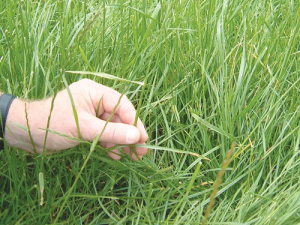More farmers renewing pasture – still more to go
Renewing 10% of New Zealand farm pasture annually would ensure productivity and performance gains achieved via new species do not dwindle over a 10-year cycle.
 Pasture renewal rates throughout NZ are very low – at around 2.5% for sheep and beef farms and only 8% for dairy farms.
Pasture renewal rates throughout NZ are very low – at around 2.5% for sheep and beef farms and only 8% for dairy farms.
Despite plenty of evidence showing the clear benefits of renewing pastures, renewal rates in New Zealand remain very low, claims the Pasture Renewal Charitable Trust.
“Pasture renewal rates nationwide are very low – around 2.5% for sheep and beef farms and only 8% for dairy farms,” says the trust’s project manager Tim Wood.
“Yet there are plenty of reasons and evidence available to suggest it is beneficial to renew older pastures.”
Wood says though research shows many farmers know the benefit of planting new pastures, many perceive barriers, including: it is expensive; new grasses don’t persist; they need greater maintenance; it is too hard (to take paddocks out of production/difficult to fit into current farm management etc); and planting new pastures is an ‘intensive’ farming practice unattractive to farmers who regard themselves as running low input farming systems.
“The end result is that some farmers may appreciate the benefits, but do not have the knowledge or confidence to give it a go,” Wood says. “However, done properly the risks are minimised.”
He says there is a big difference between a farm’s poorest producing pastures and its best paddock. “That difference in dry matter production will be having an impact on your bottom line.”
He says modern forage cultivars have been bred to improve productivity and offer benefits such as: they establish quickly; produce more dry matter per hectare; resist pests and disease better; are more palatable, making them easier to manage; have a higher feed value (ME) so stock do better; grow more feed than weed grasses in winter and summer conditions; and are a variety of cultivars bred for specific conditions to suit every farm type and operation.
Wood says replacing poor-producing paddocks with new pasture is profitable, and “one of the simplest ways to invest onfarm for a significant and relatively predictable return”.
He adds that the higher a farm’s performance, the more it can gain from intensifying its pasture renewal.
“But the benefits of pasture renewal are easily achieved in any sort of farming operation. Pasture renewal is not just a ‘high input’ farming practice; it can be incorporated into any farm management programme. And the benefits are obtainable on all grazing-based enterprises.”
Keratin biomaterials company Keraplast and Wools of New Zealand have signed a new superpremium wool contract which is said to deliver a boost to wool growers.
While things are looking positive for the red meat sector in 2026, volatility in global trade remains a concern, says the Meat Industry Association (MIA).
The quest to find innovative practical, scientific solutions to deal with water-related issues at a catchment level has been the theme of an important conference at Massey University last week.
One of the country's top Māori farms faces a long and costly rebuild to get the property back to where it was before recent storms ripped through it.
The latest Global Dairy Trade auction results have delivered a boost to dairy farmers.
New Zealand potato growers are prioritising value creation from high yields to meet a complex mix of challenges and opportunities, says Potatoes NZ chief executive Kate Trufitt.

OPINION: First on the scene after the recent devastating storms in parts of the North Island were emergency services and selfless…
OPINION: Why can't Christopher Luxon stand up to Winston Peters over the latter’s high-profile attack on the proposed Indian FTA?